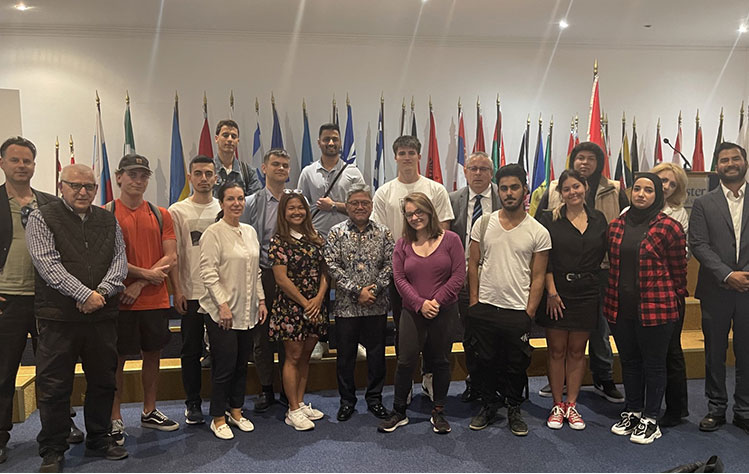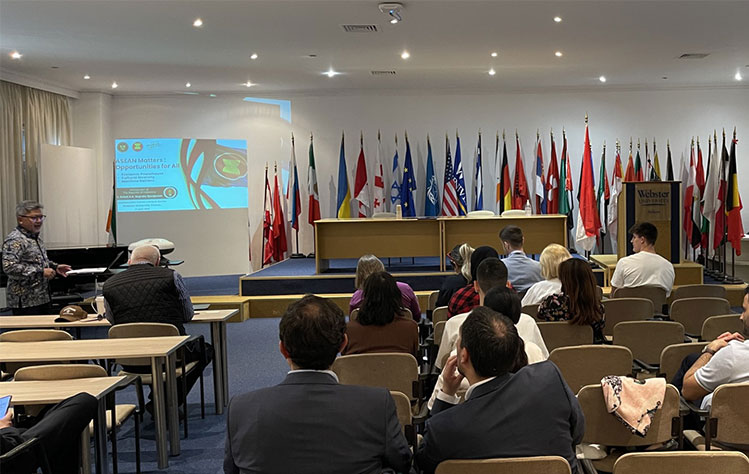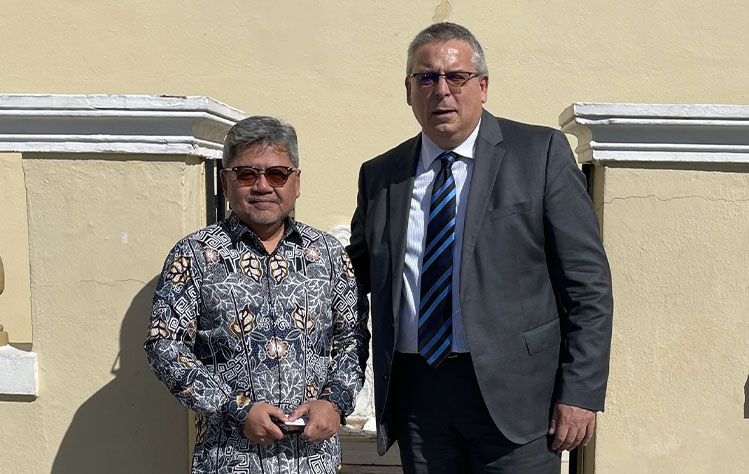Indonesian Ambassador to Greece Presents at Webster Athens Ambassadors’ Forum
April 25, 2024
 Ambassador of the Republic of Indonesia to Greece, H.E. Bebeb A.K. Nugraha Djundjunan,
center, poses for a photo after his presentation with Webster Athens students.
Ambassador of the Republic of Indonesia to Greece, H.E. Bebeb A.K. Nugraha Djundjunan,
center, poses for a photo after his presentation with Webster Athens students.
The Ambassador of the Republic of Indonesia to Greece, H.E. Bebeb A.K. Nugraha Djundjunan,
recently presented on behalf of the Association of Southeast Asian Nations (ASEAN)
to Webster University Athens students. The ambassador was welcomed and introduced
by Rector Vasilis J. Botopoulos at the event, held in Webster Athens’ Cultural Center.
The presentation took place as part of Webster Athens’ ongoing Ambassadors’ Forum.
It covered Indonesia's role within ASEAN, bilateral cooperation between Indonesia
and Greece, and included discussions on the Hellenic-ASEAN Business Council. ASEAN
is a regional intergovernmental organization comprising 10 member countries in Southeast
Asia. Established on Aug. 8, 1967, with the signing of the ASEAN Declaration (Bangkok
Declaration) by its five founding fathers — Indonesia, Malaysia, the Philippines,
Singapore and Thailand. The other five countries that joined the organization are
Brunei Darussalam, Cambodia, Laos People’s Democratic Republic (PDR), Myanmar and
Vietnam.

Ambassador of the Republic of Indonesia to Greece, H.E. Bebeb A.K. Nugraha Djundjunan,
begins his lecture.
Djundjunan described ASEAN as an emerging global region and an “Economic Powerhouse,” a
term he noted is often cited in international academic journals. He highlighted ASEAN's
large market size, exceeding 650 million people, its robust economic growth, substantial
trade and investment flows and the establishment of the ASEAN Economic Community (AEC).
These elements, he emphasized, have collectively positioned ASEAN as a global hub
of growth.
Djundjunan underscored the significance of inter-regional collaboration in a globalized
world like ASEAN, asserting that it fosters economic growth, innovation and addresses
global challenges. He emphasized its role in promoting cultural understanding, contributing
to peace and supporting sustainable development goals, all while bolstering regional
integration efforts.
Regarding the geopolitics of the ASEAN, Djundjunan explained that what sets this inter-regional
organization apart and enables it to maintain regional peace and cooperation is its
unique diplomatic engagement with member states. “The ‘ASEAN Way’ is known as the
practice of non-interference among its member states,” explained Djundjunan.
As part of his presentation, Djundjunan gave detailed information about Indonesia’s
roles in ASEAN.
“Indonesia, as a founding member of ASEAN, plays a pivotal role in the organization's
leadership, mediating conflicts and advancing regional cooperation agendas. With its
large economy, Indonesia drives economic growth and integration within ASEAN, while
ensuring maritime security and navigation. Its rich cultural heritage contributes
to ASEAN's identity, while its advocacy for environmental stewardship and diplomatic
engagement reinforces the organization's objectives of peace, stability and unity
in Southeast Asia.”
When discussing bilateral cooperation between Indonesia and Greece, the ambassador
referred to the 2019 Economic Cooperation Agreement for advancing economic cooperation
between Indonesia and Greece for the period of 2023 – 2028. Its plan of action was
signed by both ministries of Foreign Affairs in May 2023. This cooperation fosters
efforts in trade promotion and investment, small and medium enterprise and industry,
tourism, infrastructure, logistics and transportation, maritime and shipbuilding education
and capacity building.
“Greece holds significant potential for cooperation with ASEAN across diverse sectors,”
said Djundjunan. “Leveraging its strategic location and expertise, Greece and ASEAN
can build mutually beneficial partnerships with ASEAN, contributing to economic growth,
regional integration and enhanced bilateral ties in Southeast Asia.”
The ambassador also discussed the ASEAN Committee in Athens (ACAT), which serves as
a platform for coordinating between the embassies of ASEAN countries in Athens. He
also spoke about Hellenic ASEAN Business Council (HABC), a dynamic platform to strengthen
ties between Greece and member countries of ASEAN.
“The Council will bring key stakeholders, including government officials, business
leaders and industry experts, to facilitate dialogues, exchange of knowledges and
explore avenues of cooperation,” Djundjunan said.
Djundjunan is the Ambassador Extraordinary and Plenipotentiary of Indonesia to the
Hellenic Republic. A PhD candidate in International Law at the University of Padjajaran, Djundjunan has
held key positions within Indonesia's Ministry of Foreign Affairs, including Director
for Legal and Territorial Treaties. With expertise in maritime law, Djundjunan has
contributed to negotiations on Indonesia's maritime boundaries and served as Deputy
Chief of Mission in Bangkok. He has received prestigious awards including the 2020
Honorary Award for Chief Negotiator.
 Ambassador of the Republic of Indonesia to Greece, H.E. Bebeb A.K. Nugraha Djundjunan,
left, with Webster Athens Rector Vasilis J. Botopoulos.
Ambassador of the Republic of Indonesia to Greece, H.E. Bebeb A.K. Nugraha Djundjunan,
left, with Webster Athens Rector Vasilis J. Botopoulos.
Webster Athens’ diverse student body, including students majoring in international
relations, actively engaged in the presentation. They discussed the intricacies of
regional policies and global partnerships with emphasis on Southeast Asian diplomacy
and collaboration, based on the knowledge they acquired from the presentation.
To add a delightful touch to the event, students indulged in traditional Indonesian
cuisine immersing themselves in the unique flavors of Indonesia.
The lecture was part of the Ambassadors’ Forum lecture series, an initiative organized
by the International Relations Department at Webster University Athens. The first
forum was held in 2016. Since then, it has been held annually to enrich students’
understanding of global diplomacy and international relations through visits from
ambassadors and official representatives.
The Forum seeks to encourage intellectual exchange and promote global consciousness
by offering perspectives on foreign policy, international organizations, cooperation,
security and bilateral/multilateral issues. The 2024 forum, which began on March 21,
is scheduled to conclude on April 25.
